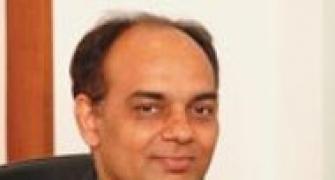 When it comes to children, every parent would like to give them the best of everything.
When it comes to children, every parent would like to give them the best of everything. With costs of education sky-rocketing, parents often wonder about their capability to provide adequately for their child's higher education in future.
Assuming schooling is taken care of, we will look at how you can plan for your child's graduate studies.
The cost of professional courses at undergraduate levels are exorbitant, unless your child can get into government institutions, where fees are affordable. Your child should not be denied an opportunity to enter her chosen vocational area for paucity of funds.
So, as a parent you need to plan to provide funds. Some degree courses, such as medicine and engineering, architecture, can be very expensive. If the actual requirement turns out to be lower than what you planned for, the balance can be redirected for other goals.
Inflation in education is very high, so over the years, the costs are going to rise substantially. A course which costs Rs 4 lakh today can cost Rs 10.37 lakh in 10 years at 10 per cent inflation.
A plan made this way, including inflation, will have you more or less prepared to provide the funds when the time comes. The plan can be fine-tuned as the child is towards the end of schooling.
For post-graduation studies, the education can be funded by a loan, where the parent can be a guarantor. As the student would start working right after the post graduate studies, he or she can repay the loan in installments when the earnings start.
Start early; Compound
If you start early and invest the maximum you can, the effect of compounding will create a better corpus over time. For education of your child, you can start when the child is born. If the funds are not sufficient at the beginning of your career, start allocating funds as you progress.
It is possible to plan for education at later stages, too, but the allocation of resources required will be very high. The portions of your investments earmarked for funding education should be sacrosanct and not be utilised for any other purpose.
Instruments
You have to be prudent in your choice of investment vehicles. Emotional advertising is very much in vogue to lure you to products which say they'll help fund your child's future, especially unit-linked insurance plans (Ulips).
Products which have the name 'children's plans' may actually not be necessary or suitable to fulfil your needs. You need to understand the underlying asset and strategy of the product before jumping in to buy one.
Ulips are sold as a short-term products. They are expensive and you need to look at the fine print before signing on the dotted line.
If you have already invested in a Ulip, you need to stay invested for the complete tenure of the fund and keep contributing to it regularly. If you withdraw it before the tenure, the initial costs may eat into your returns..
Since the tenure available is very long, in most cases more than 10 years, investments in equity should work well.
Direct equity investing can give excellent results, but you need to take care to pick up quality stocks, diversify optimally and hold for long periods. Most of the time, a small systematic investment plan (SIP) in mutual funds will see you through.
Land or property is a favourite among many for long-term goals. The initial outlay will be very high. It can give good capital growth over longer periods, but is very illiquid.
The lack of liquidity may impede your goals. Property prices are also cyclical in nature and the cycles may be quite long. Your investments may not yield the returns you expected if the cycle is on the downward trend.
Public Provident Fund is an excellent product in the fixed returns category. An investment of Rs 70,000 per annum over the 15-year duration, with an annual compounded return of eight per cent, will give you about Rs 20 lakh.
This can be a huge support to fund your child's education. Since it is risk-free, guaranteed and tax-free at withdrawal, this product is a must for every portfolio.
You can plan your investments well, but if you miss out on protection strategies, all your planning will go waste. Adequate health and life insurance can keep your plans viable even in the unforeseen circumstances of disability or death.
As the time for the need of funds gets closer, you need to give paramount importance to preservation of capital and move from riskier assets to risk-free/low-risk assets, to protect the growth accumulated over the years.
The writer is a certified financial planner.








